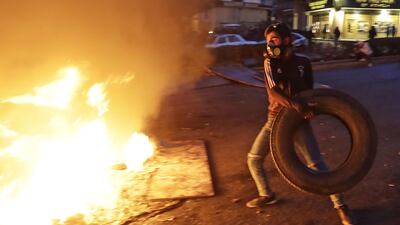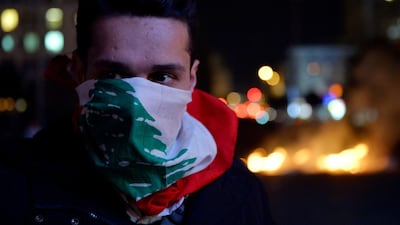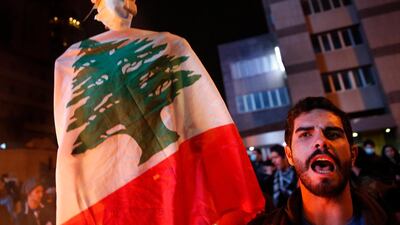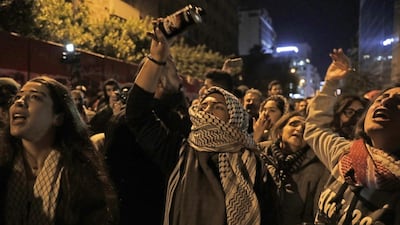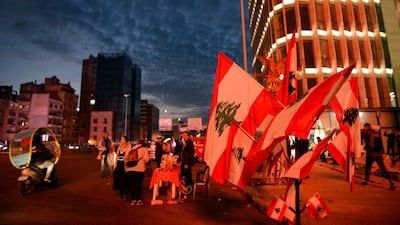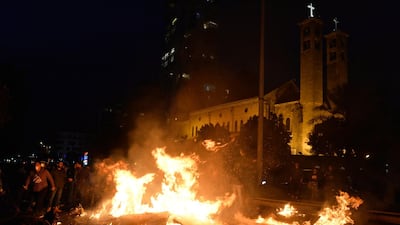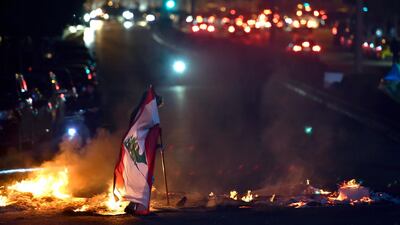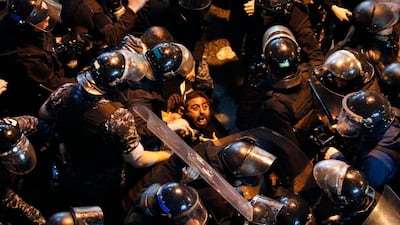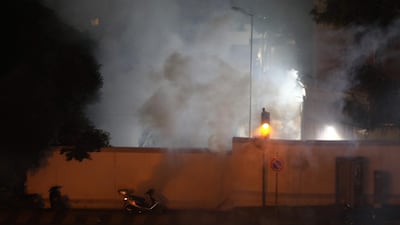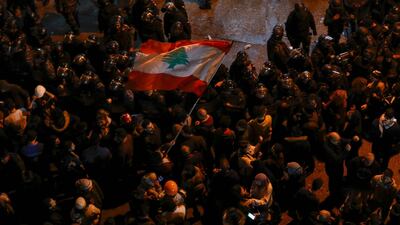Lebanon's increasingly violent protests could prompt the formation of a new government in coming days, nearly three months after the previous government stepped down in the face of nationwide anger over the country's severe economic crisis, analysts and politicians said on Thursday.
"I think we will have a government in the next two days," a caretaker minister told The National after Beirut was rocked by a second consecutive night of rioting.
“Not forming a government in the next days means rekindling the revolution,” said Sami Nader, director of the Levant Institute for Strategic Affairs in Lebanon.
Despite a liquidity crisis and a surge in unemployment, Lebanon has remained without a government since October 29, when Saad Hariri resigned as prime minister. Lebanese taking part in protests that broke out on October 17 say the country’s ruling elite, in power since the early 1990s, is corrupt and incapable of reforming the country’s finances.
After a lull of several weeks during a rainy Christmas and New Year period, the protesters launched a "week of anger" on Tuesday as Lebanon's economic crisis worsened. The protesters vandalised banks, once the cornerstone of the local economy but now the target of anger after imposing limits on withdrawals and other transactions.
Several protesters who spoke to The National on Tuesday said they were giving politicians, who have been bickering over power-sharing 48 hours to form a cabinet. Dozens have been arrested or injured in clashes with security forces since then, including journalists. Caretaker Interior Minister Raya Hassan condemned the violence as "unacceptable" but said that riot police were "very tired".
University professor Hassan Diab was appointed prime minister designate on December 9 and has vowed to form a cabinet of independent specialists. But he has faced stiff resistance from several of the main political parties that backed his nomination in the first place, including President Michel Aoun’s Free Patriotic Movement and Parliament Speaker Nabih Berri's Amal party.
"Political parties in the Lebanese establishment have yet to realise that October 17 was a turning point. They are still digging in their heels and trying to maximise their part of the pie, but the new prime minister seems determined to insist on forming a relatively restrained government of 18 ministers", Karim Bitar, an international relations analyst at the Paris-based Institute for International and Strategic Affairs, told The National.
The government usually comprises at least 30 ministers divided along the Lebanon's main religious communities, which is not conducive to implementing fast-paced reform.
But leading politicians decided to work towards forming a new government after protests picked up again last weekend, local media reported, citing political sources.
"It is clear that the resurgence of the protest movement in the street has something to do" with this development, wrote Scarlet Haddad, a columnist for the L'Orient-Le Jour newspaper who is reputedly close to the FPM. Last week, "certain parties were thinking of pushing [Mr Diab] out" because they were "shocked" by his inflexibility, she added.
Last Friday, Mr Diab tweeted a strongly worded two-page statement reiterating his commitment to forming an independent government that would exclude ministers from the previous cabinet.
Several outgoing ministers declined to comment when contacted by The National. "All I can say is that serious efforts are being deployed to have a government asap [as soon as possible]. So the less we talk the better it is," caretaker Environment Minister Fady Jreissati said in a WhatsApp message.
Should Mr Diab succeed in forming a government, analysts have expressed doubts as to whether he would manage to save the crumbling economy.
“Most of the personalities that are mentioned are indeed independent professionals, but they are not personalities that would enter into a direct confrontation with the political system. Most of them have been approved by the ruling parties,” said Mr Bitar. “Questions remain as to how much leeway they will have to implement ambitious structural reforms and overhaul the economy.”
Mr Nader was more pessimistic. “Placing puppets, even if they look good, will not solve Lebanon’s problems. Should the government implement true reforms, that will destroy the source of income of political parties that thrive on corruption,” he said.
“Politicians are betting on the new government’s collapse. They think that that will allow them to come back in full force.”

